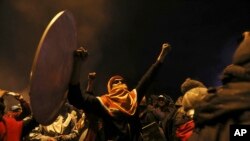Following days of violent protests, Ecuadorian President Lenin Moreno reversed himself late Sunday and canceled an austerity program that triggered the public's anger. Many of Ecuador's indigenous populations were at the forefront of the protests.
Even though stability has been restored, concerns remain that journalists and reporters, who say they were assaulted by government forces while covering the protests, will remain targets of oppression by security personnel.
Fundamedios, an Ecuadorian nongovernmental organization created in 2007 to support media and journalists, reported that 42 reporters from 23 Ecuadorian media outlets suffered some type of aggression while covering the protests.
The organization recorded 24 cases in which police officers violently approached journalists, photographers and camera operators. There were also 11 cases of verbal aggression by protesters against journalists, and a cameraman was hit by a taxi driver.
Denunciation
The Ecuadorian National Union of Journalists (UNP) denounced the physical and verbal assaults by security forces against media professionals covering the protests. In other cases, demonstrators insulted and attacked reporters, even during live broadcasts.
Fundamedios demanded that the national government guarantee the protection of the work of journalists. "It is not possible that so many professionals have been assaulted by the National Police in such a violent manner while fulfilling the duty of informing citizens," said the organization in a statement.
News outlets reported the Pichincha Universal radio station was raided by security forces. Station owners blamed the police and the prosecutor's office.
In an interview with VOA, Natalie Southwick of the Committee to Protect Journalists (CPJ) said the organization continues to closely monitor the violence and short-term arrests. She reiterated the right of journalists to cover demonstrations and political events in countries where they occur.
Southwick also noted that since the time of former President Rafael Correa, there has been in Ecuador "a history of censorship and very strong patterns of repression against the press."
"Many authorities are already accustomed that the press will criticize them," Southwick said. "People have the right to protest, and the press has every right to be covering these actions."
The current situation, she said, is new "for both the security forces and the press; the police are not used to handling demonstrations where there is a lot of press, so there is a lack of awareness, but they have to make sure journalists can do their job safely."
Other nations
Southwick also said what is happening in Ecuador is not that different from what happens with the press in many other nations where government protests occur. "What we are seeing in Ecuador is what we are seeing in many countries of the world that are in the middle of the storm," she said.
Because of increased violence against journalists in Ecuador, Moreno's office issued a statement reminding the police and civil society about the relevance of journalism. It's not clear whether canceling the austerity plan will reduce assaults against reporters.
"We recognize the importance of the journalistic exercise to keep citizens informed in a truthful and timely manner. Therefore, all acts of violence must be criticized and denounced to the competent authorities," the statement said.
According to some observers, however, the assaults do not represent a systematic campaign by the government against the media or press freedom. A veteran Ecuadorian journalist described the events as isolated incidents that in some cases were caused by inexperienced reporters.
"If I stand in front of a policeman who is doing his job and they beat me, I will not cry," said Jaime Mantilla, former president of the Inter-American Press Association and former director of the Ecuadorian newspapers El Comercio and Hoy.
"These days there are many hypersensitive journalists who no longer like to do their work and only live in social media," Mantilla said.







